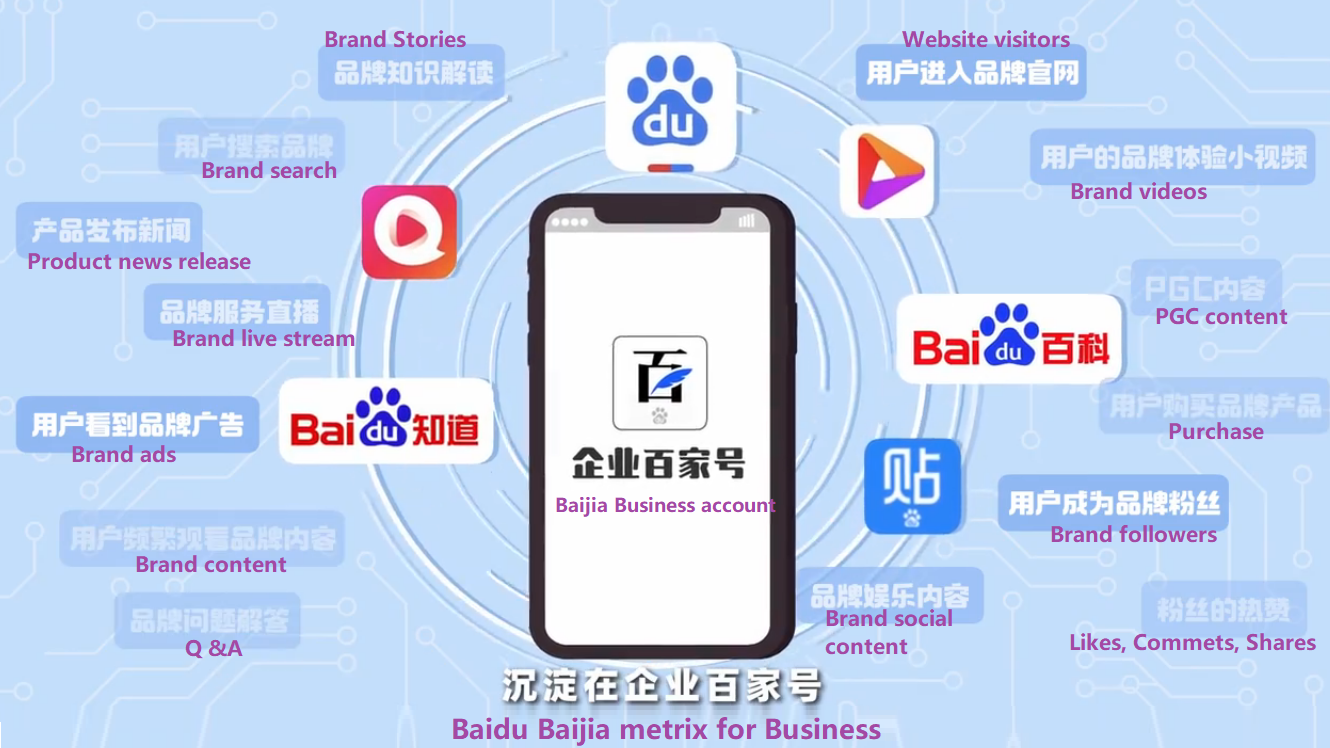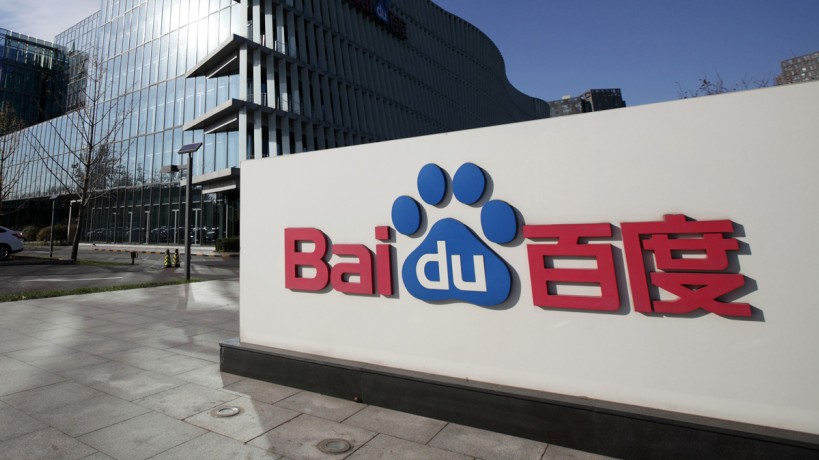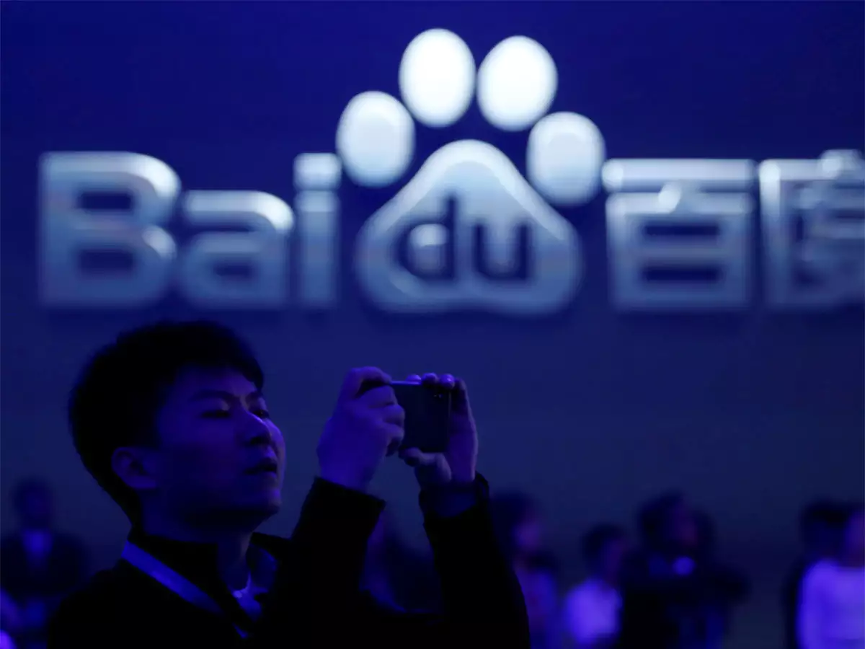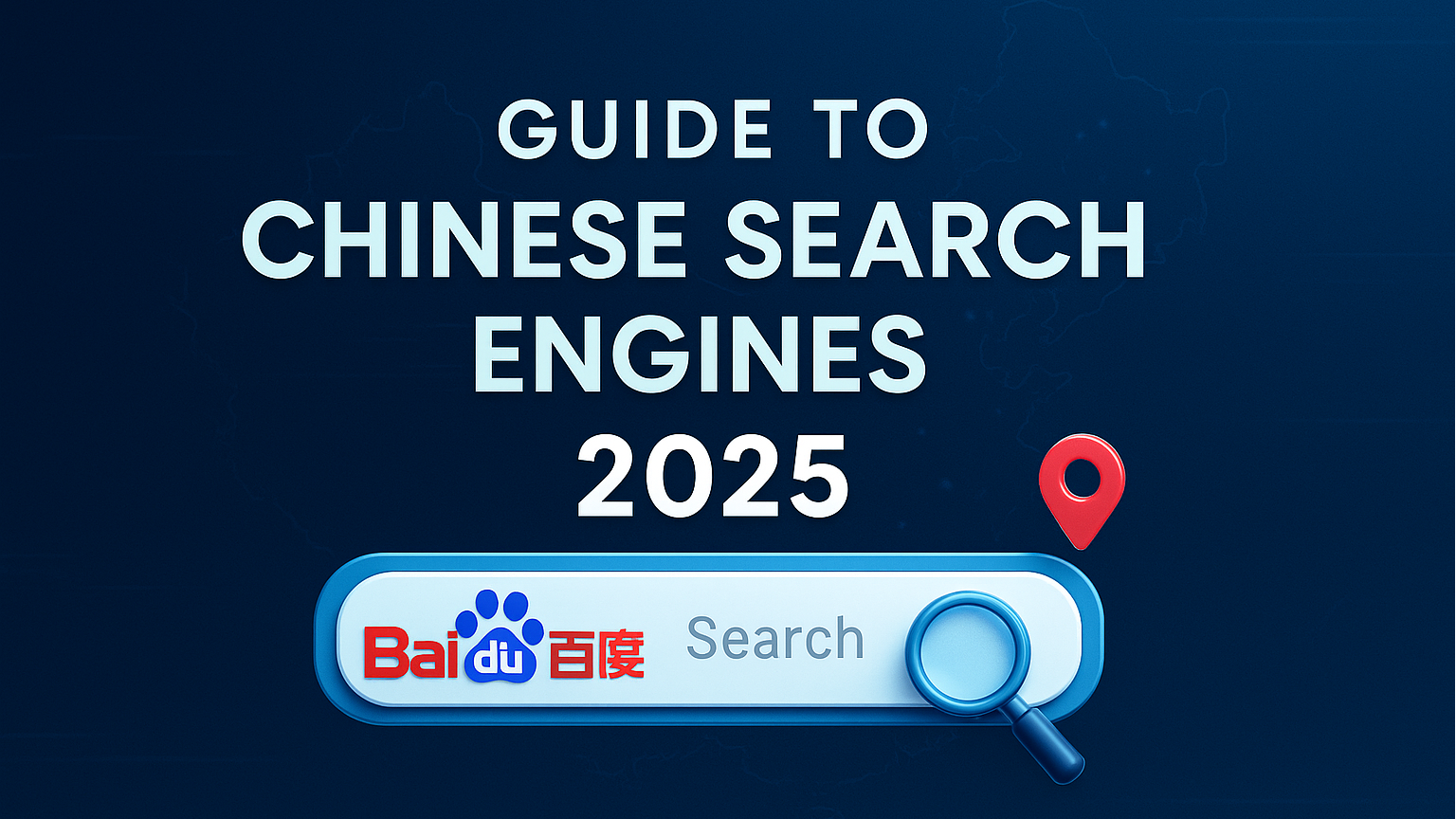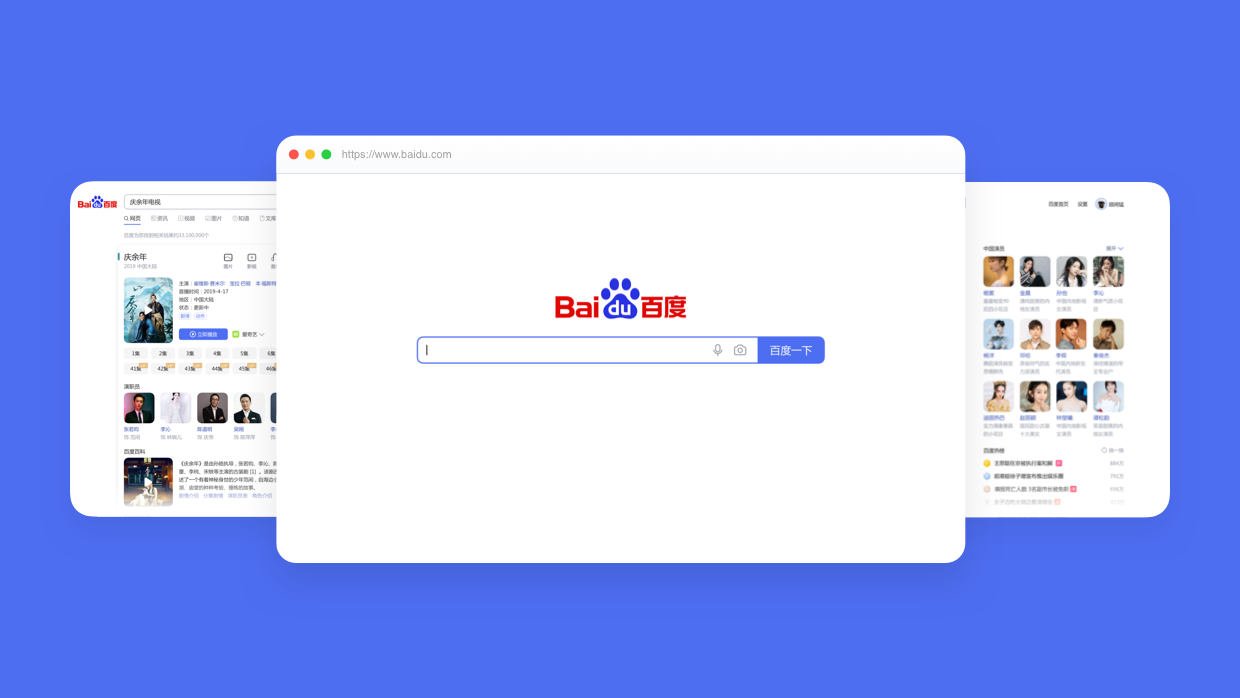
China's search engine market has undergone significant transformations since 2000, shifting from a nascent phase to a mature ecosystem driven by AI, mobile technology, and vertical specialization. This evolution, characterized by four distinct stages, reflects broader changes in China's internet landscape, including the rise of mobile computing, the integration of AI, and the growing importance of vertical search services. From Baidu's dominance in the early years to the emergence of new competitors like Bing and the development of agent-based search technologies, the market has continuously adapted to meet evolving user needs and technological advancements.
1. Development Stages and Key Events in China's Search Engine Market
The development of China's search engine market can be clearly divided into four phases, each marked by significant technological advancements and market shifts.
The first phase, from 2000 to 2004, was the nascent stage. Baidu was established in 2000, introducing the slogan "Baidu yi xia, ni jiu zhiDAO" (Baidu it, and you'll know). At the same time, foreign search engines like Yahoo and Google entered the Chinese market. During this period, search engines primarily served as basic information retrieval tools, with limited focus on user experience or personalized services. The market was characterized by simple algorithms and minimal competition, as Baidu began to establish its position as a leading search engine in China.
The second phase, from 2005 to 2012, was the technology upgrade stage. In 2005, Google launched its Chinese service (Google.cn), but due to policy and regulatory challenges, it announced its withdrawal from the Chinese market in 2010. This event significantly altered the market dynamics, strengthening Baidu's dominance. In 2004, Sogou introduced its third-generation search engine, which combined technology and human intervention to enhance query capabilities. In 2012, Qihoo 360 launched 360 Search, leveraging its free security software user base to capture a significant share of the market. By 2014, Baidu's mobile user base exceeded its PC user base for the first time, marking the beginning of the mobile internet era. However, the rise of apps began to erode the search engines' status as primary entry points, as users increasingly turned to platforms like Toutiao, Bilibili, Zhihu, and Xiaohongshu for information retrieval.
The third phase, from 2013 to 2020, was the mobile internet transition stage. As smartphones became more widespread, mobile search engines gained prominence due to their convenience and real-time capabilities. Baidu solidified its position as the market leader, with its share reaching as high as 84.3% in 2022. During this period, Baidu expanded its ecosystem by integrating products like Baidu Tieba (a social platform) and Baidu Baike (an online encyclopedia), while also developing its own search advertising model, Baidu's Paid Placement. Other competitors, such as Sogou and Qihoo 360, continued to challenge Baidu's dominance but faced significant hurdles in capturing market share.
The fourth phase, from 2021 to 2025, is the AI-driven reconstruction stage. The emergence of generative AI has revolutionized search experiences, with AI models like Baidu's WEN AI and Google's Gemini providing more context-aware and personalized responses. By 2025, AI technologies have become integral to search engines, with features like Agent Mode and multimodal search gaining traction. For instance, Baidu's "XIN Xiang Agent" supports over 200 task types, including AI story creation and health consulting, allowing users to interact with AI in a more natural and intuitive way. Additionally, the rise of hardware search, such as smart speakers and car navigation systems, has introduced new entry points for search engines, with voice interaction accounting for over 60% of search requests on these devices.
2. Market Structure and Competitive Landscape
The competitive landscape of China's search engine market has evolved significantly over the years, with shifts in market share and strategies among key players.
In the PC internet golden age, Baidu's dominance was almost absolute, with a market share of 84.3% in 2022. However, by 2025, the market landscape has changed dramatically. According to recent data, in the PC market, Bing now holds the largest share at 50.99%, while Baidu's share has dropped to 30.15%. Haosou (Good Search) accounts for 14.24%, Sogou 1.76%, and other competitors make up the remaining 3.0%. In the mobile market, Baidu still leads with a 58.6% share, followed by Bing at 25.49%, YANDEX at 4.6%, Haosou at 4.13%, Sogou at 3.11%, and Shenhua at 2.85%. This shift in market share reflects the growing influence of international search engines in China's market, despite ongoing regulatory challenges.
The competitive landscape is also characterized by diverse strategies among market leaders:
Baidu has adopted an "ecosystem" strategy, integrating search with information flow and mini-programs, covering 90% of Chinese web pages and achieving a mini-program ecosystem GMV exceeding 300 billion yuan (approximately $42 billion USD).
Bing has focused on AI integration, introducing features like AI Mode and deep search, while leveraging its partnership with Windows 10 as the default search engine in China to expand its user base.
Sogou, with the support of Tencent, has integrated its search engine with its input method and browser, creating a seamless user experience. Its "Lizhi" (Stands) enterprise knowledge graph service now serves over 100,000 small and medium-sized enterprises, improving contract review efficiency by 80%.
360 Search, originally named Haosou (Good Search), has shifted its focus to specialized searches, such as its "Liang Yi" (Good Doctor) medical search service, which combats false medical advertising and enhances user trust.
Vertical search has emerged as a new competition front. In the medical field, Baidu's "Ling Yi Zhi Hui" (Smart Medical) covers over 300 diseases, with an AI diagnostic accuracy rate of 95% and partnerships with over 5,000 hospitals. For enterprise services, Sogou's "Lizhi" enterprise knowledge graph service helps 100,000+ small and medium-sized enterprises, improving contract review efficiency by 80%. In government services, "Sui Shen Ban" (Citizen Service) integrates 300+ government services, achieving a 90% one-stop handling rate and a 98% user satisfaction rate.
3. How AI Technology Reshapes Search Functionality and User Experience
AI technology has fundamentally transformed search functionality and user experience in China's search engine market.
Generative AI has significantly improved search result satisfaction, reaching 75%, and increased user retention by 20%. Baidu's WEN AI now provides generative answers for knowledge-based questions, with users spending 40% more time on such pages. This shift means that search results are no longer just lists of links but structured, personalized information that addresses users' underlying needs without requiring them to click through multiple pages.
Agent Mode represents another major innovation in AI search. This feature allows search results to directly call upon services like food delivery or ride-hailing, achieving a transaction closure rate of 25% and contributing over 100 billion yuan (approximately $14 billion USD) in GMV. Baidu's "XIN Xiang Agent" supports over 200 task types, including AI story creation and health consulting, and developers can benefit through subscription or revenue-sharing models. This evolution transforms search from a simple information retrieval tool to a comprehensive service platform where users can complete transactions or other actions directly within the search process.
Multimodal interaction technology has expanded the boundaries of search beyond traditional text-based queries. Baidu's smart speakers, such as the Smart Speaker Mate Pro, support voice, button, gesture, and motion control, connecting to IoT cloud services. Similarly, Xiaohongshu's multimodal search function has increased click-through rates and page views by 2-3 times. These advancements make search more natural and convenient, allowing users to input search queries through multiple modalities and receive results in various formats.
Privacy computing technologies have become crucial in AI search, addressing compliance requirements while maintaining service quality. Federated learning frameworks are used in advertising systems, with model accuracy loss controlled at less than 1% and user privacy leakage risks reduced by 90%. Blockchain-based evidence storage ensures the integrity and traceability of search records, with practices like these improving ad ROI by 22% on average and reducing user complaints by 65% through smart contract permission controls.
User experience improvements are evident in three key areas:
Depth of thinking: AI search engines can now understand and address users' deeper needs, providing comprehensive answers rather than just links.
Multi-terminal fusion: Search is no longer limited to mobile screens but extends to smart speakers, car navigation systems, and AR glasses, creating a seamless cross-terminal experience.
Personalization: Search results are dynamically adjusted based on users' historical behavior, geographical location, and interest preferences, offering more precise and tailored information.
4. User Behavior Changes and Future Market Directions
User behavior in China's search engine market has evolved significantly, with distinct trends emerging in different segments.
Usage rates have decreased slightly from 82.4% in 2016 to 75.7% in 2023, reflecting a diversion of user traffic to non-traditional search channels like social media and apps. However, user scale continues to grow, from 640 million in 2017 to 829 million in 2021, with a compound annual growth rate (CAGR) of 6.67%. The growth rate has slowed, indicating that the market is entering a more mature phase.
Search scenarios have become more diverse. By 2024, users perform searches in various contexts, including work, life, entertainment, and shopping. Different scenarios have distinct search preferences and requirements. For example, in work scenarios, users prioritize efficiency and accuracy, while in life scenarios, they value convenience and personalization. In shopping scenarios, price comparisons and product evaluations are crucial.
Content preferences have shifted from text-based searches to multimodal searches. Among Gen Z users, 40% now prefer to use AI for questioning, and this number is expected to exceed 50% by the end of 2025. This shift has led to a decline in traditional search engine click-through rates to 2-3%, while AI answers maintain a higher rate of 5-6%. Users are increasingly looking for structured answers directly from the search engine rather than having to click through multiple links.
Advertising tolerance has decreased significantly. A 2024 survey revealed that 84.9% of users believe Baidu's paid listing mechanism lacks adequate review processes, and 47% of users think the medical regulatory authorities should bear primary responsibility for the Wei Zexi incident. This indicates a growing demand for transparent, reliable search results, particularly in sensitive areas like healthcare.
The future market directions are expected to focus on three key areas:
Verticalization: Specialized search in areas like medical, legal, and educational fields will grow, with paid consultation conversion rates exceeding 30% and Average Revenue Per User (ARPU) reaching 80 yuan (approximately $11 USD).
Intelligence: Agent-based search will become the norm, allowing users to interact with AI in a more natural way, receive personalized responses, and complete tasks directly through the search interface.
Privacy: Compliance requirements will drive technological advancements, with privacy-preserving computing techniques like federated learning and blockchain storage becoming standard.
5. Regional Market Differentiation and Emerging Growth Points
China's search engine market exhibits clear regional differentiation, with distinct user needs and preferences across different areas.
In first-tier cities like Beijing and Shanghai, search advertising spending accounts for 35% of the national total, but growth has slowed to 10-12%, indicating a transition to a saturated market. Users in these regions are more demanding in terms of search result accuracy and personalization, and they are more likely to use AI-driven advanced search features.
The lower-tier markets have become the primary growth area for search engines. Users in third-tier and below cities make up 55% of search users, and video search usage exceeds 60% among this group. These users are more focused on practicality and price comparisons, with higher tolerance for advertising in search results.
The overseas market also presents growth opportunities. TikTok's search function now holds a 30% market share in Southeast Asia, while Baidu has achieved a daily active user (DAU) of over 10 million in markets like Brazil and Egypt. Chinese search engine companies are expanding their global influence by leveraging their understanding of local languages and cultures in emerging markets.
Three emerging growth points are particularly notable:
Vertical search: Specialized search services in medical, legal, and educational fields are gaining popularity, with high paid conversion rates and ARPU values.
Hardware search: Smart speakers, car navigation systems, and other hardware devices are generating over a billion search requests annually, with voice interaction accounting for over 60%.
Overseas markets: Chinese search engine companies are pursuing globalization strategies, particularly in emerging markets.
6. Technological Trends and Business Model Innovations
Technological advancements and business model innovations are shaping the future of China's search engine market.
Three major technological trends are driving this evolution:
Generative AI: This technology has improved search result satisfaction to 75% and increased user retention by 20%.
Multimodal interaction: Search engines are no longer limited to text input and output. Voice, image, video, and even gesture-based searches are becoming common.
Privacy computing: Techniques like federated learning and blockchain storage are being widely applied in advertising systems.
Business model innovations are also transforming the search engine industry:
Advertising: Search advertising remains the primary revenue source, totaling 1,200 billion yuan (approximately $168 billion USD), but its proportion has decreased from 75% to 65%.
Subscription services: Knowledge subscription services have become the second growth curve, with 250 million paying users and subscription revenue growing at 35% annually.
Transaction closure: Local life services now account for over 15% of GMV, with a search-to-redemption conversion rate of 12%.
7. Challenges and Opportunities for the Future
China's search engine market faces both challenges and opportunities as it continues to evolve.
Among the challenges:
Technological challenges: AI search still has limitations in handling complex problems.
User experience challenges: Users have become more demanding in terms of search result accuracy and reliability.
Compliance challenges: With the increasing importance of privacy protection, search engine companies face higher compliance requirements.
Despite these challenges, there are significant opportunities:
AI technology innovation: Generative AI, Agent Mode, and multimodal interaction are creating new possibilities for search engines.
Vertical search growth: Specialized search in fields like medical, enterprise, and government services is expected to grow rapidly.
Hardware search commercialization: Smart speakers, car navigation systems, and other hardware devices are generating substantial search traffic.
8. Conclusion and Insights
China's search engine market has evolved from its birth in 2000 to a mature, AI-driven ecosystem by 2025, reflecting broader technological and societal changes. Over the past two decades, the market has gone through four distinct stages: birth (2000-2004), technology upgrade (2005-2012), mobile internet transition (2013-2020), and AI-driven reconstruction (2021-2025). Each stage was marked by significant technological advancements and shifts in user behavior.
The market landscape has changed dramatically, with Baidu's PC market share dropping from 84.3% to 30.15%, while Bing's share has increased to 50.99%. In the mobile market, Baidu still leads with 58.6%, but Bing's share has grown to 25.49%. This shift indicates that users are seeking more diverse search experiences, and AI-driven search engines are gaining traction.
AI technology has reshaped search functionality, moving from simple link lists to context-aware, personalized responses. Agent Mode allows users to interact with search engines in a more natural way, completing tasks directly through the search interface. Multimodal interaction extends search to voice, image, and video, making it more accessible and convenient. Privacy computing techniques ensure that these advancements do not compromise user privacy.
User behavior has evolved from relying on search engines as primary information sources to using them as part of a broader digital ecosystem. Search is no longer just about finding information but also about engaging with AI, completing transactions, and accessing specialized services.
Looking forward, the search engine market will continue to evolve, with vertical search, hardware search, and overseas expansion presenting significant growth opportunities. Companies that can effectively integrate AI, address user privacy concerns, and provide specialized services will be well-positioned to succeed in this changing landscape.
In conclusion, China's search engine market has transformed from a tool for information retrieval to a comprehensive service ecosystem that supports users in their daily lives, work, and entertainment. This evolution is a testament to the power of technology to shape and enhance human experiences, and it offers valuable insights into the future of digital services globally.


